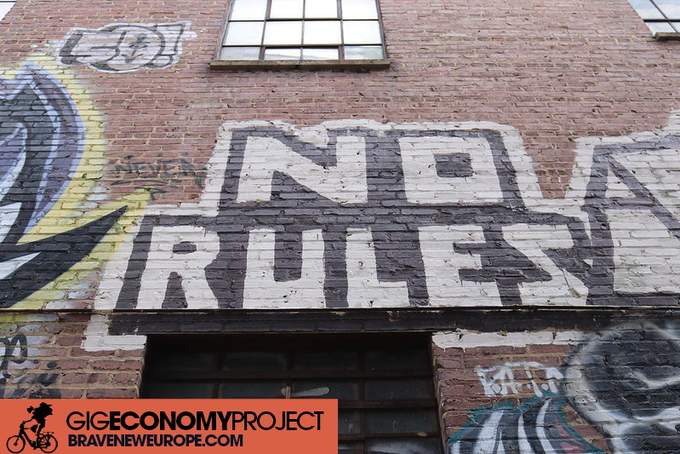Robert Ovetz argues that the lack of contractual rules governing platform workers could actually be an advantage for organised gig workers, who are increasingly relying on maximum disruption of the capital accumulation process.
This piece is the third and final part in a series by Ovetz for the Gig Economy Project on the strategy & tactics of gig worker struggle. Part 1 (which can be accessed here) explored Prop-22 and why aiming for control over work rather than representation is more effective, while Part 2 (which can be accessed here) made the case for self-organised struggle in the gig economy, highlighting key examples from Europe and the US. A version of this series will be published as a chapter in an upcoming Routledge Handbook of the Gig Economy, for which Ovetz is an assistant editor.
Robert Ovetz is a lecturer at San Jose State University in California, USA, and is author of ‘When Workers Shot Back: Class conflict from 1877 to 1921’ (2018) and editor of ‘Workers’ Inquiry and Global Class Struggle: Strategies, Tactics and Objectives’ (2020). He is the book review editor of the Journal of Labor and Society. Follow him on Twitter @OvetzRobert. The Gig Economy Project recently spoke to Ovetz in a podcast to discuss the ‘Workers’ Inquiry’ book.
The Gig Economy Project, led by Ben Wray, was initiated by BRAVE NEW EUROPE enabling us to provide analysis, updates, ideas, and reports from all across Europe on the Gig Economy.
This series of articles concerning the Gig Economy in the EU was made possible thanks to the generous support of the Foundation Menschenwürde und Arbeitswelt


Robert Ovetz: Why no contracts can be an advantage in gig worker organising
Robert Ovetz argues that the lack of contractual rules governing platform workers could actually be an advantage for organised gig workers, who are increasingly relying on maximum disruption of the capital accumulation process.
This piece is the third and final part in a series by Ovetz for the Gig Economy Project on the strategy & tactics of gig worker struggle. Part 1 (which can be accessed here) explored Prop-22 and why aiming for control over work rather than representation is more effective, while Part 2 (which can be accessed here) made the case for self-organised struggle in the gig economy, highlighting key examples from Europe and the US. A version of this series will be published as a chapter in an upcoming Routledge Handbook of the Gig Economy, for which Ovetz is an assistant editor.
Robert Ovetz is a lecturer at San Jose State University in California, USA, and is author of ‘When Workers Shot Back: Class conflict from 1877 to 1921’ (2018) and editor of ‘Workers’ Inquiry and Global Class Struggle: Strategies, Tactics and Objectives’ (2020). He is the book review editor of the Journal of Labor and Society. Follow him on Twitter @OvetzRobert. The Gig Economy Project recently spoke to Ovetz in a podcast to discuss the ‘Workers’ Inquiry’ book.
DESPITE the resounding victory for the gig companies in passing Prop 22, they now find themselves threatened by the lack of willing workers, two out of three of whom quit within six months. This has forced Uber to spend $250 million in higher incentives and guarantees to ensnare new unsuspecting drivers in Spring 2021, while also reportedly raising rates to customers facing longer wait times. The companies have begun to ramp up their lobbying by stocking up on former Obama administration officials. They are also swinging the revolving door with Jake Sullivan, who worked as a consultant for Uber during negotiations to amend AB5, entering the Biden administration as the National Security Advisor.
Ultimately, despite the regulatory clawback and political influence, the companies have been unable to escape their reliance on workers to generate their profits. This may demonstrate that despite the new algorithmic management strategy for controlling labour, workers still retain the power and leverage over the companies by disruption and the withdrawal of their labour. As Alex Rosenblat succinctly noted: “They control many aspects of how [workers] do their job, and that control is indirect. Is it not clear that the app is your boss, or the algorithm is in control.”
‘No contract, no rules’
Without firm commitments by big unions in the sector, gig worker organising has the advantage of what I call ‘no union, no contract, no rules’. In the US, the hesitation of local, state, and federal officials to declare gig worker organising as a violation of anti-trust law has already transformed gig workers into de facto employees even as they remain de jure independent contractors.
This gives immense advantage to workers who can take job and strike action and engage in solidarity (‘secondary’ in US labour law) strikes without legal sanction. While they of course would not be protected from being fired or disciplined for such collective action, few unionised workers are protected from this now, especially precarious contract workers (like myself). Organised autonomously, these unions can act free of the harness of the contract, untempered and unimpeded by ‘cooling off’, ‘fact finding’, arbitration, and mediation rules that tie the hands of unionised workers itching for a fight.
Without the constraints of labour law and contracts, gig workers have discovered and deployed a new strategy of ‘collective logouts’; strikes that disrupt or shut down the algorithmic driven machine. While their impact has been modest, dispersed, and difficult to sustain, workers have used this strategy to disrupt one of the most powerful sectors of the global economy and find ways to undermine capital’s strategy of algorithmic management of labour, forcing these companies to sometimes concede to modest demands to make them stop. It will take constant organising and vigilance to defend and expand these gains. Not only will labour law not replace the need to constantly organise, but it is a tactic for stifling and clawing back these gains.
The degree of retaliation is a measure of the degree of threat. Small numbers of well organised gig workers have demonstrated the ability to disrupt the functioning of cities, business districts, and the movement of people and goods. As Jamie Woodcock and Mark Graham insightfully observe in their ‘Critical Introduction to the gig economy’: “The threat of legal injunctions means that workers are not only having an effect on the gig economy, but are redefining what organising and trade unionism mean today.”
As this strategy becomes the new predominant means of organising all work it is incumbent on organised workers to study and circulate these tactics and strategies by adapting them to their own conditions.
Gig workers have proven they can win
The demonstrable impact of these relatively small strikes raise doubts about union claims of the futility of organising gig workers. In response to German Deliveroo and Foodora workers organising self-organised elected workers councils, a right under German labour law, with support in several cities in 2018-19, Deliveroo retaliated by changing all its contract workers to self-employed. Several companies have threatened or actually engaged in capital strikes, threatened mass layoffs, and are attempting a technological fix by rushing drone and self-driving cars into operation. Lyft warned in its 2019 pre-IPO SEC filing that it needs to develop its own self-driving cars to survive.
Gig companies have also lost big against small upstart self-organised workers. Some companies have been banned from operating in countries, been forced to recognise militant gig worker unions, signed contracts, set up company unions, conceded to new local laws extending limited worker benefits, and raised wages. In the EU, some companies have conceded after repeated losses in labour, appellate and supreme courts, and been sanctioned with fines and criminal convictions.
In California, the companies shattered a national record in spending on a ballot initiative to buy a new law, Prop 22, after losing at work, in the courts, and the state legislature. If these companies’ algorithmic management strategies were as impervious to worker organising as some unions have feared, we would have expected to have seen little or few of these concessions or defeats.
Conclusion
The passage of Prop 22 in California was an outlier among a growing list of global losses for the app companies. Small, autonomous, and independent rank and file run unions are continuing to deploy disruptive tactics and strategies specific to their conditions of work under algorithmic management.
For self-organised gig workers struggles to continue to assert their autonomy, it will require a vigilant effort to avoid being channeled into advocacy and lobbying for accountability at the expense of the struggle for control. The predictable consequences of advocating for accountability is that self-organised gig workers struggles will be increasingly directed to maintaining, monitoring, and enforcing court rulings, laws, and regulations, battles they cannot win in the long term. This strategy will dissipate their focus on organising for control in the workplace where they hold the potential to contest the power of the app over their, and ultimately all of our, labour.


Be the first to comment